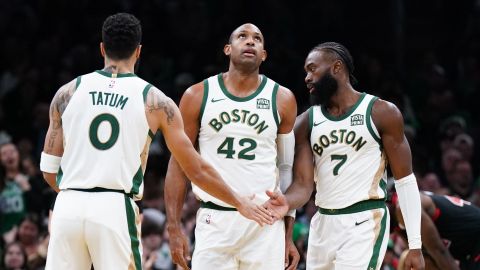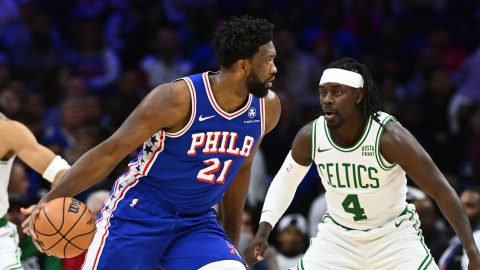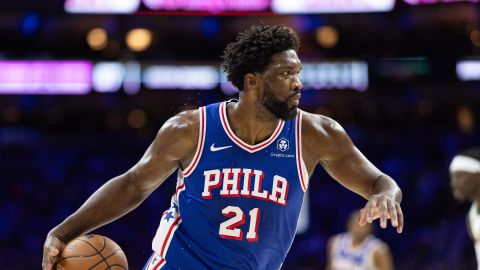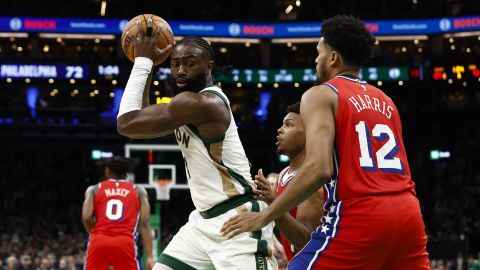 When I was in high school, everybody had the latest DMX album.
When I was in high school, everybody had the latest DMX album.
It didn’t matter if your jeans sagged to your mid-thighs or if you spent your mornings carefully gelling the blonde tips in your hair. You rolled into the Weymouth High School parking lot (or someplace like it) blaring It’s Dark and Hell is Hot at least once a week. You saw Romeo Must Die at the Braintree megaplex on a Friday night after strolling around the South Shore Plaza.
Don’t lie. You did this. We all know it.
Ten years after the release of Grand Champ, the last album that I recall him putting out, DMX is decidedly no longer ubiquitous. He released an album just last year, apparently, but I didn’t notice. Part of this is my fault, but most of it isn’t. I may be an old fuddy duddy daddy, but I’m aware of Jay-Z‘s current tour with Justin Timberlake. Shawn Carter is still a superstar. DMX is not.
The news that Allen Iverson plans to formally retire from the NBA at the age of 38 sometime in the next few days makes me think of DMX. In the late 1990s and early 2000s, Iverson and DMX were the biggest of the big, surefire future legends in their fields. They still are standouts in their particular niches, but when Iverson officially retreats from the game, his departure will barely resonate beyond those fans who were really paying attention.
Protest all you like, fanboys. Just be real. I’m aware Iverson concluded his career with the 76ers in 2010 after an aborted, three-game stint with the Grizzlies, but that’s because I’m a basketball geek who cares about the goings-on of the NBA far too much. Were you? If so, how many of the people sitting near you right now know this? How many one-time DMX fans who now have jobs and honey-do lists and credit card payments actually bothered to notice that DMX performed at the BET awards two years ago?
As Iverson fades into post-basketball life, it is important to remember that he once was not just the face of the Philadelphia franchise, but the face of the NBA. For better or worse, Iverson defined that era of professional basketball: cornrows, baggy shorts, XXXL white T-shirts, Timberland boots, 20-second clear-out isolation plays that ground every possession to a halt on the court while one player tried to break down a defender one-on-one in a million-dollar version of the AND-1 Mixtape.
It was awful basketball. It spawned the stardom of unbearable ball hogs like Stephon Marbury, Steve Francis and Baron Davis. Yet Iverson was treated differently at the time, as a tier above all those players, because he was different from them.
All anybody needs to know about Iverson is that he is still beloved in Philly, even after all his personal and legal troubles and despite all his outbursts on the court. Without watching him on a regular basis, you cannot understand how hard and how passionately he played. Every athlete claims to give his all. Iverson showed a generation of basketball fans what doing that really meant.
At 6-foot-nothing and weighing less than some junior varsity players, Iverson led the league in minutes per game seven times. He averaged more than 40 minutes per game for 11 times, barely missing a dozen straight such seasons by playing a paltry 39.4 minutes per game in 1997-98. His infamous “practice” rant is misunderstood outside of Philly. Among Sixers fans, the predominant reaction to Iverson’s anti-practice raving was agreement. The guy was putting his body on the line every other night — why not give him a couple of days off?
In the post-Iverson era, the quality of play in the NBA has objectively improved. The loosening of the illegal defense rule makes isos more difficult to pull off, and today’s stars don’t necessarily want to be pigeonholed as ball-hogging chuckers, anyway. The NBA has become a league full of Tracy McGrady wannabes, gracefully playing angles and exercising every limit of their versatility rather than charging wildly into a wall of 7-footers, hoping to get bailed out by a foul call.
At the same time, the league has lost something. The easy criticism is that players as a whole don’t care as much nowadays, and that’s absurd. Nobody thinks any athletes play as hard as they recall athletes playing in their childhoods. That sentiment is generally a bunch of hooey.
What the NBA — and sports — have lost since Iverson’s departure is not that players do not play as hard as a whole. What’s been lost is one of the standard-bearers for playing one’s heart out, for playing like there is no tomorrow, even with self-destructive consequences. Every time sports loses one of those, the games lose a bit of their context. Fans can’t really measure themselves against pro athletes, after all. Most of us can’t imagine dunking like LeBron James or throwing a baseball 100 miles per hour like Justin Verlander. But we can watch a regular-sized guy like Iverson dart around the court, fearlessly taking on abnormally large humans, and understand.
The untruthful among us, though, pretend they never saw themselves reflected in this poor kid from Newport News, Va. They forget they were reckless, impetuous, stupid young adults who thought “Only The Strong Survive” T-shirts made them unique and bumping DMX made them rebels. Most of us grew out of that (terrible) phase, but we admit we went through it. We admit that we’d take a confused young man who makes some bad decisions but also leaves it all on the court, because we were all confused young people once, and we would like to think that we would leave it all on the court, too, if our positions were reversed.
Have a question for Ben Watanabe? Send it to him via Twitter at @BenjeeBallgame or send it here.
Photo via Facebook/Allen Iverson ‘The Answer’



